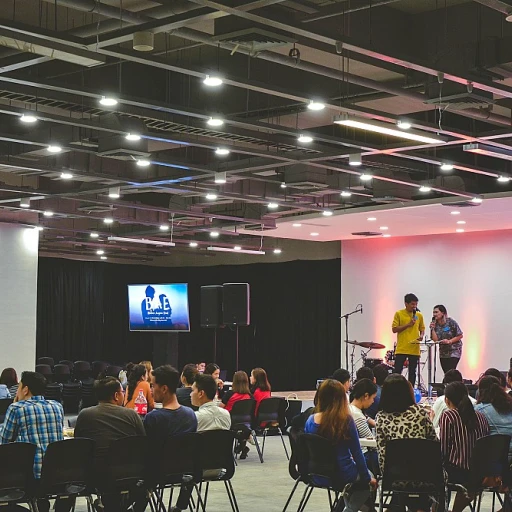
Understanding Recruitment Process Outsourcing
What is Recruitment Process Outsourcing?
Recruitment Process Outsourcing (RPO) is a strategic approach where a business transfers all or part of its recruitment processes to an external service provider. This model is particularly beneficial for talent management agencies working with creators and influencers, as it allows them to focus on core activities like influencer marketing and brand partnerships while the RPO provider handles the recruitment logistics.
Benefits of RPO for Talent Management
For talent agencies and managers, RPO offers several advantages:
- Scalability: RPO providers can quickly adjust to the fluctuating demands of hiring influencers and creators, ensuring that talent needs are met efficiently.
- Expertise: With specialized knowledge in digital marketing and social media, RPO firms can identify and attract top talent, enhancing the agency's ability to manage successful campaigns.
- Cost Efficiency: By outsourcing recruitment, agencies can reduce overhead costs associated with full-time recruitment teams, allowing for more budget allocation towards creative projects and influencer talent development.
RPO's Role in Influencer and Creator Management
In the dynamic world of social media and digital content, the role of RPO extends beyond traditional recruitment. It involves understanding the unique needs of creators and influencers, aligning them with brand goals, and ensuring long-term partnerships. This approach not only supports talent managers in their daily work but also enhances the overall effectiveness of influencer marketing strategies.
For those interested in exploring how RPO can enhance efficiency in talent management, particularly in the context of supply chain service outsourcing, you can learn more here.
The Role of Talent Management Agencies
The Significance of Talent Management Agencies in the Influencer Landscape
In today's dynamic world of digital marketing, the role of talent management agencies has become increasingly pivotal for creators and influencers. These entities act as the vital link between influencers and brands, ensuring seamless coordination and fruitful partnerships.
Talent management agencies serve several critical functions, including:
- Brand Partnerships: Agencies facilitate connections between influencers and brands, promoting authentic collaborations that align with both parties’ interests and values.
- Campaign Management: By overseeing the performance of marketing campaigns, talent managers ensure the effectiveness and reach of influencer content, enhancing overall social media impact.
- Negotiation and Contracts: Talent agents handle all aspects of negotiation, from setting fair compensation to drafting user agreements, ensuring influencers and creators focus on their work without worry.
- Long-Term Development: These agencies focus on the long-term growth of creators by identifying new opportunities and jobs that align with an influencer’s personal brand.
By relying on skilled talent managers, influencers can focus on content creation, while agencies handle the business aspects. This partnership fosters a productive environment where creators and brands thrive through strong social media campaigns and effective influencer marketing strategies.
For businesses, choosing the right talent agency can enhance efficiency and boost the potential of influencer talent, making it crucial to navigate options carefully. Agencies provide a structured approach toward talent management, tailored to evolving marketing trends.
As this space continues to grow, leveraging the expertise of talent agencies remains invaluable both for brands seeking partnerships and for influencers aiming for career advancement within the digital landscape.
Challenges in Coordinating Creators and Influencers
Overcoming the Coordination Challenges in Influencer Collaboration
The world of influencer marketing is vast and multifaceted. It's a dynamic field but comes with its own set of challenges when coordinating talent such as creators and influencers. Proper management is crucial for both brands and influencers to ensure seamless partnerships. Influencers often juggle various platforms, from social media to blogs, and have their unique style and voice. Talent managers must align their unique brand with marketing strategies. Misalignment can cause misunderstood expectations and unmet goals. Effective communication is crucial. Talent managers must bridge the creators and brand partnerships, ensuring a shared understanding of campaign objectives. Collaboration is at the heart here; influencers need project clarity to deliver authenticity in their content. Moreover, celebrity managers and agencies often have to handle a full-time roster of influential personalities. This requires organized logistics management and the delegation of tasks. Employing a cohesive system of database management can streamline this, thus reducing stress on both parties involved. Negotiating contracts and user agreements poses another potential challenge. Coworking between talent managers, creators, and businesses requires skill and diplomacy to iron out terms beneficial to all. Transparency throughout the campaign period ensures a long-term relationship and trust. To navigate these challenges, agencies often rely on digital marketing tools to track efficiency and performance. This helps evaluate the influencer's engagement metrics and the efficacy of a campaign. : Navigating the complexities of influencer collaborations requires strategic planning and robust communication systems. If managed diligently, these hurdles can be overcome, leading to successfully executed influencer marketing strategies and fruitful collaborations.Strategies for Effective Talent Coordination
Building a Cohesive Talent Management Strategy
To effectively coordinate creators and influencers, talent management agencies must develop a cohesive strategy that aligns with both the brand's objectives and the individual goals of the talent. This involves understanding the unique strengths and styles of each creator or influencer, ensuring that their personal brand resonates with the campaign's message. A well-rounded strategy considers the following elements:
- Clear Communication: Establishing open lines of communication between the talent manager, influencers, and brands is crucial. This ensures that everyone is on the same page regarding campaign goals, deliverables, and timelines.
- Customized Campaigns: Tailoring campaigns to fit the unique voice and audience of each influencer can enhance authenticity and engagement. This requires a deep understanding of both the influencer's style and the brand's identity.
- Long-term Relationships: Fostering long-term partnerships between brands and influencers can lead to more consistent and impactful marketing efforts. This involves nurturing relationships beyond single campaigns, focusing on mutual growth and success.
- Data-Driven Decisions: Utilizing analytics to track performance and engagement helps in refining strategies and making informed decisions. This data can guide future campaigns and improve overall effectiveness.
Leveraging Team Dynamics for Success
Successful talent management requires a collaborative approach where each team member, from talent managers to social media strategists, plays a vital role. Here’s how agencies can leverage team dynamics:
- Role Clarity: Clearly defining roles within the management team ensures that each member understands their responsibilities, reducing overlap and enhancing efficiency.
- Regular Training: Keeping the team updated with the latest trends in influencer marketing and digital media ensures that they can provide the best support to creators and influencers.
- Feedback Mechanisms: Implementing regular feedback loops allows for continuous improvement and adaptation to the ever-evolving social media landscape.
By focusing on these strategies, talent management agencies can effectively coordinate creators and influencers, driving successful campaigns and fostering meaningful brand partnerships.
Technology's Impact on Talent Management
The Digital Transformation of Talent Management
In the ever-evolving landscape of talent management, technology plays a pivotal role in shaping how talent agencies operate. The integration of digital tools has revolutionized the way talent managers coordinate with creators and influencers, enhancing efficiency and effectiveness in influencer marketing campaigns.
Streamlining Communication and Collaboration
One of the most significant impacts of technology is on communication. With the rise of social media platforms and digital communication tools, talent managers can now maintain seamless interactions with their teams and clients. This ensures that all parties involved in a campaign, from the talent agency to the brand, are on the same page. Tools like project management software and instant messaging apps facilitate real-time updates, making it easier to manage influencer talent and brand partnerships.
Data-Driven Decision Making
Data analytics has become a cornerstone in the management of talent. By leveraging data, talent managers can make informed decisions about which influencers to collaborate with, based on metrics such as engagement rates, audience demographics, and past campaign performance. This data-driven approach allows for more targeted and effective marketing strategies, ensuring that brands achieve their desired outcomes.
Automation and Efficiency
Automation tools have also made significant strides in the recruitment process. From automating repetitive tasks to streamlining the hiring process, technology allows talent agencies to focus on more strategic aspects of talent management. This not only saves time but also reduces the likelihood of human error, ensuring a smoother workflow for all parties involved.
Enhancing User Experience
For creators and influencers, technology enhances the user experience by providing platforms that facilitate easy collaboration and content sharing. These platforms often come with built-in analytics and reporting features, allowing influencers to track their performance and optimize their content for better engagement.
Challenges and Considerations
Despite the benefits, integrating technology into talent management is not without its challenges. Talent managers must navigate issues such as data privacy, user agreements, and the constant need to stay updated with the latest digital marketing trends. Additionally, the human element of talent management cannot be overlooked, as personal relationships and trust remain crucial in successful collaborations.
As technology continues to evolve, talent agencies must adapt to these changes to remain competitive. By embracing digital tools and strategies, they can enhance their capabilities and provide better services to both creators and brands, ultimately driving long-term success in the industry.
Future Trends in Talent Management for Creators and Influencers
Predicted Developments in Talent Management for Creators and Influencers
The future of talent management for creators and influencers is set on a path of evolution, heavily influenced by the digital age and the shifting dynamics of today's marketing landscape. Understanding these developments helps businesses and talent managers prepare for what lies ahead.Interestingly, the rise of new technologies and social media platforms has reshaped the way talent managers operate. There's a noticeable push towards personalized, data-driven marketing strategies, allowing talent management agencies to connect more seamlessly with brand partners. This evolution offers a greater level of efficiency but also demands a higher level of expertise from influencer talent agents and managers.
- More Sophisticated Data Analytics: With the advent of advanced analytics tools, talent agencies can tailor campaigns more effectively, assessing social media trends and optimizing influencer marketing strategies for better engagement.
- Conversion Metrics Enhancement: Moving beyond mere impressions or likes, talent managers focus on sophisticated metrics that measure the true impact of influencer campaigns on business objectives and consumer behavior.
- Partnerships as a Key Focus: Long-term brand partnerships are becoming essential. Collaborations between creators and brands are more strategic, focusing on sustainable team-building opportunities that benefit both sides profoundly in the long term.
- Integration of Artificial Intelligence: AI tools are increasingly supporting talent management operations. From predicting trends to optimizing content placements, AI entities are becoming integral in enhancing management processes.
Moving forward, the role of a talent manager and influencer manager will be defined by their adaptability to new digital trends. This adaptability is crucial in managing influencer talent effectively, resulting in campaigns that resonate better with target audiences.
The trend towards holistic management approaches, where social media strategies are aligned with overall business goals, is a natural result of these changes. Social influencers and creators can expect more agency support that caters to their personal brand development, ensuring their place in the fast-evolving social media marketing arena.













